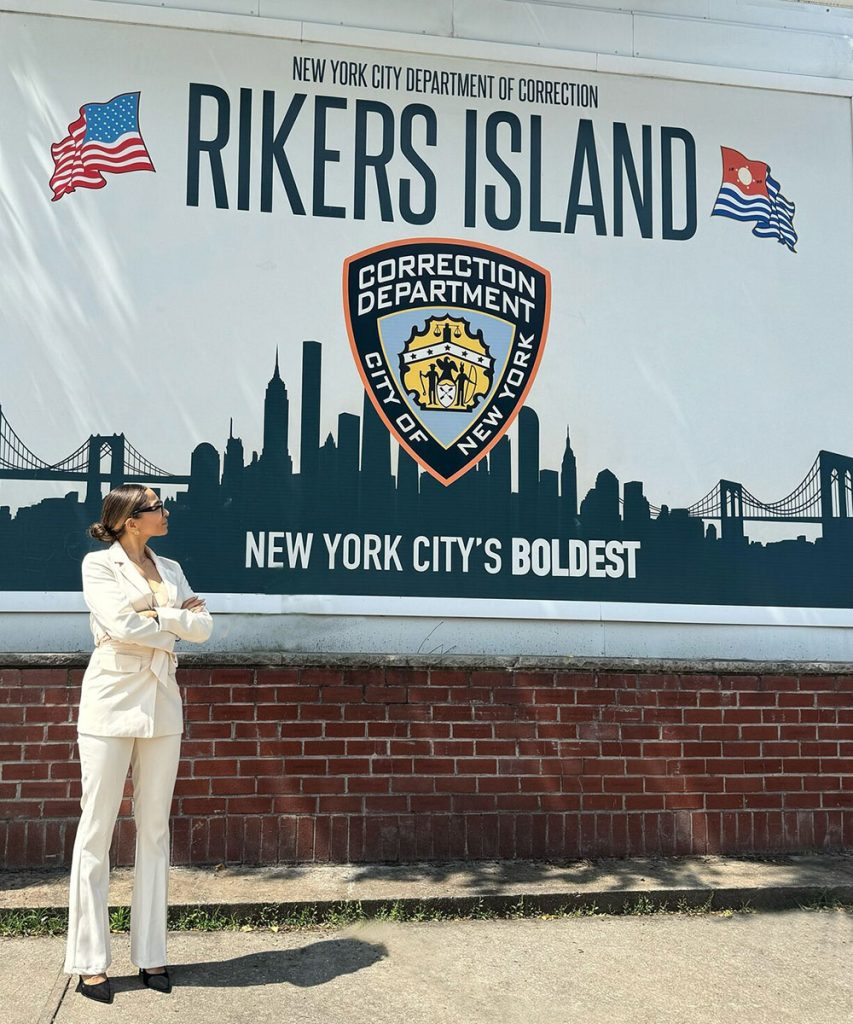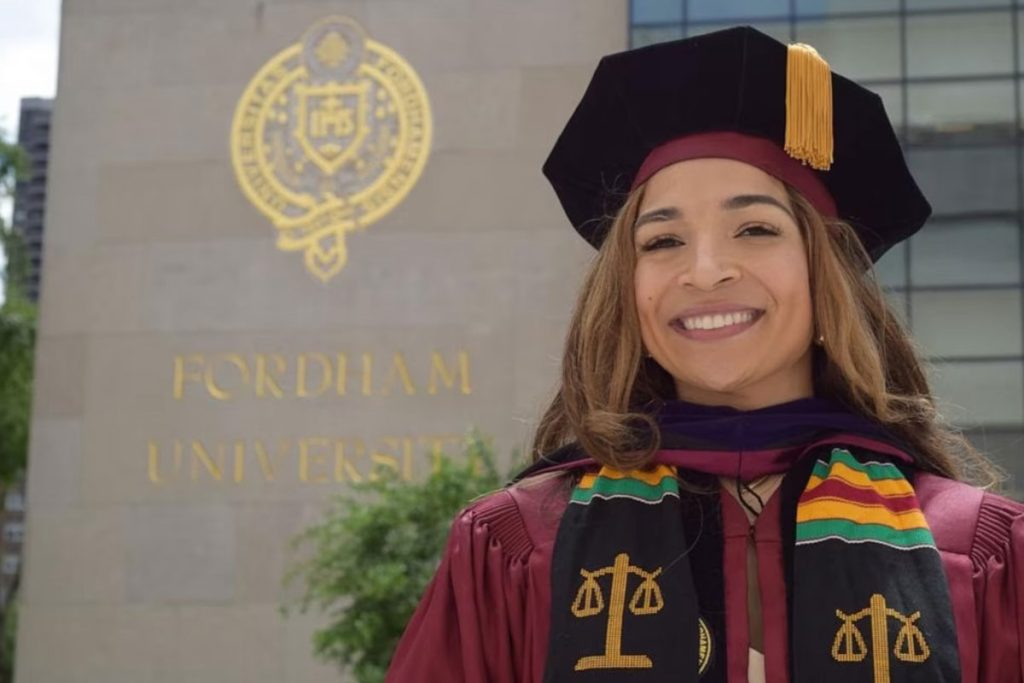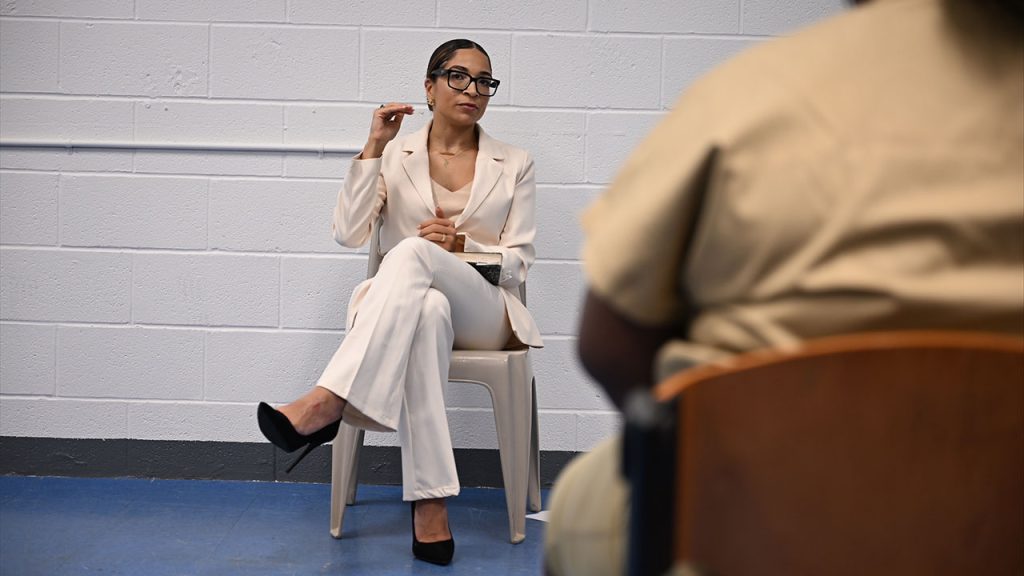Returning to Rikers, where I had been jailed at 17, I urged the young women incarcerated there to be survivors and warriors—and to believe they deserve a future that looks nothing like their past.
An Essay by Afrika Owes, Fordham Law School Class of 2024
When I returned to jail this past summer, I lost a bet I made with a correction officer in 2011—that I would never set foot in Rikers again. Back then, I also wrote in my journal that I’d become a lawyer. I kept that pledge. As I walked through those familiar halls, this time as an invited speaker, I recalled the number they once gave me: 6001100148. That number stripped away who I was. It was a constant reminder that I was just a body, a statistic, a faceless soul among hundreds in a system designed to forget me. But that number couldn’t erase my name, my identity, my aspirations.
I returned to Rikers in July to talk with young women at the Rose M. Singer Center, where I had been incarcerated at 17. In their eyes I saw the same fear, the same sadness, and the same yearning for hope that mine had reflected 13 years earlier. I had been one of them, convinced that a bright future wasn’t something I deserved. But now I stood before them not as 6001100148 but as a woman who had fought like hell to reclaim her name and her power.

Less than 10 miles from where I served my six-month sentence, Fordham Law School was integral in that battle. Drawn to the University by the support and leadership of the Black Law Students Association, whose president went so far as helping me with my law school application, I soon found mentors who believed in me and opportunities that led to my success.
At Rikers that day, I told the women the truth: The system wasn’t built to rehabilitate them. It would try to break them. I had been where they were—lost, angry, ashamed, and hungry for love. My life felt like a series of small deaths. Every court date that got pushed back, every visit that never came, every letter that went unanswered. I feared I would never be seen as anything more than that number.
But what I didn’t know then, and what I needed them to understand, was that resilience—the kind that carries you through—isn’t found in the world around you. You build it within yourself, piece by piece. As I studied for the GED and SAT exams in my cell, I wasn’t just chasing a way out; I was keeping hope alive.
Hope was something no one could take from me, and it’s something I urged the women to hold on to as well. Though fragile, their hope was their power. Together with strength and purpose, it could propel them forward.
I shared the darkest parts of my journey: The nights I cried alone in my cell. The moments I thought my life was over. How after my release, the world didn’t suddenly open its arms to me. Bank accounts were closed, job offers rescinded. I was rejected again and again.
But every time someone told me “no,” I told myself “yes.” Every time the world tried to reduce me to my mistakes, I dared to believe that I was more than my past. And with each step forward, I built a new life—a life that no one ever expected me to have.
As I spoke, I watched their faces. Some were stoic, guarded, skeptical. I get it—hope is dangerous when the world has only ever let you down. One young woman, tears in her eyes, stood up and shared that she had passed her GED. She hadn’t thought it was a big deal—until that day. She realized how powerful that achievement truly was. In her, I saw my younger self—the girl who once thought she had nothing left, but now, standing before them as a lawyer, knew that she was unstoppable.
As I departed, I didn’t feel lighter. I felt the weight of the women I met, the lives they still had to live, the battles they would face. But I also felt hope. I made a promise—to myself, to those women, and to every girl who has ever been buried by the weight of the world: That world may feel impossible, but its soil is where you’ll grow.
Even within the coldest of concrete of Rikers Island, a rose will find its way to the light. Hope, like a rose breaking through concrete, defies the odds. It grows where it shouldn’t. And once it blooms, it transforms everything around it—quietly, relentlessly, and without permission.
—Afrika Owes is a 2024 Fordham Law graduate and a first-year law clerk in the tax practice group at Davis Polk & Wardwell.


